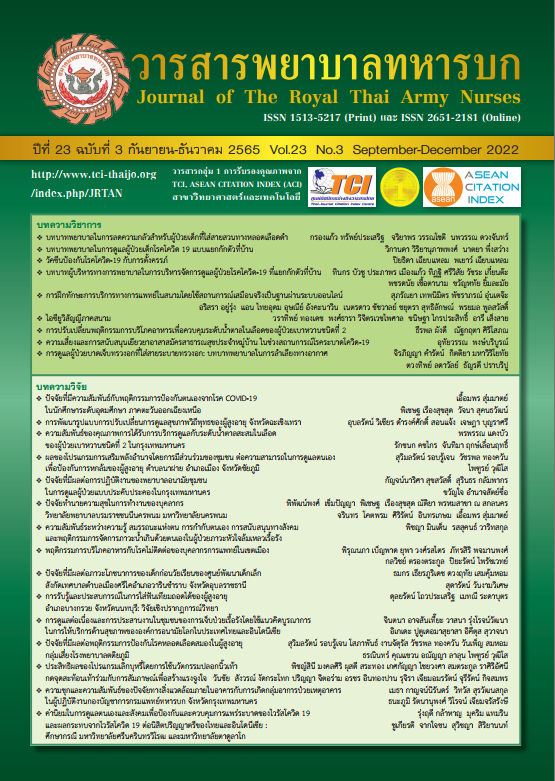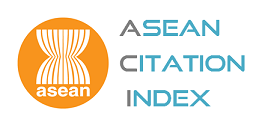ผลของโปรแกรมการส่งเสริมสมรรถนะแห่งตนตามแผนพัฒนาสาธารณสุข ต่อความรู้เจตคติและทักษะการปฏิบัติตนของมารดาหลังคลอด
คำสำคัญ:
โปรแกรมการส่งเสริมสมรรถนะแห่งตน, ความรู้, เจตคติ, ทักษะการปฏิบัติตน, มารดาหลังคลอดบทคัดย่อ
การศึกษาครั้งนี้มีวัตถุประสงค์เพื่อศึกษาผลของโปรแกรมการส่งเสริมสมรรถนะแห่งตนตามแผนพัฒนาสาธารณสุขต่อ ความรู้ เจตคติและทักษะการปฏิบัติตนของมารดาหลังคลอด เป็นการวิจัยกึ่งทดลอง กลุ่มตัวอย่างเป็นมารดาครรภ์แรกที่มารับบริการ ฝากครรภ์ คลอดและติดตามสุขภาพทารกหลังคลอดที่โรงพยาบาลชัยภูมิ แบ่งออกเป็นกลุ่มทดลองและกลุ่มควบคุม กลุ่มละ 30 คน รวมจำนวน 60 คน เครื่องมือการวิจัย ประกอบด้วย โปรแกรมการส่งเสริมสมรรถนะแห่งตน แบบสอบถามข้อมูลส่วนบุคคล แบบสอบถามความรู้ ทัศนคติและทักษะการปฏิบัติตนของมารดาหลังคลอด ผ่านการตรวจสอบความตรงโดยผู้เชี่ยวชาญและทดสอบ ความเชื่อมั่นด้วยวิธี KR20 และอัลฟาของครอนบาค ได้ค่าความเชื่อมั่น เท่ากับ .80, .80 และ .79 ตามลำดับ วิเคราะห์ข้อมูลด้วย สถิติความถี่ ร้อยละ ค่าเฉลี่ย ส่วนเบี่ยงเบนมาตรฐาน Chi-square, Paired sample t-test และ Independent sample t-test
ผลการศึกษา พบว่า มารดาครรภ์แรก กลุ่มทดลองมีคะแนนเฉลี่ยความรู้ เจตคติและทักษะการปฏิบัติตนหลังคลอดใน การดูแลตนเองและการดูแลทารกแรกเกิด ดีขึ้นกว่าก่อนการทดลองและดีขึ้นกว่ากลุ่มควบคุม อย่างมีนัยสำคัญทางสถิติ (p < .01).
ดังนั้นโปรแกรมการส่งเสริมสมรรถนะแห่งตนตามแผนพัฒนาสาธารณสุข สามารถปรับเข้ากับกิจกรรมการดูแลตนเองเพื่อพัฒนา ความรู้ เจตคติและทักษะการปฏิบัติตนของมารดาครรภ์แรกหลังคลอดได้อย่างมีประสิทธิภาพ
Downloads
เอกสารอ้างอิง
World Health Organization. Counselling for Maternal and Newborn Health Care: A Handbook for Building Skills. Geneva; 2013.
Fahey,J. O., & Shenassa, E. Understanding and meeting the needs of women in the postpartum period: The perinatal maternal health promotion model. Journal of Midwifery & Women’s Health. 2017; 58(6): 613-621.
Mokhtari F., Bahadoran P., Baghersad Z. Effectiveness of postpartum homecare program as a new method on mothers’ knowledge about the health of the mother and the infant. Iranian Journal of Nursing and Midwifery. 2018; 23(4):316.
Chonlatankampanat W., Khanobdee C., Pongrua P. The Effects of a self-efficacy promoting program on self-care behaviors and newborn care behaviors of first-time mothers. Journal of Phrapokklao Nursing College. 2018; 29(1): 29-41. (in Thai)
Planning Division, Department of health. strategic planning. Development of a health promotion system and environmental health according to the National health development: plan during the National Economic and social development plan No. 12 (2020-2022). Revised edition. Graphic and design publishing house, Bangkok; 2020. (in Thai)
Bandura, A. Self-efficacy: The exercise of control. New York: W.H. Freeman; 1997.
Rosenberg, M. J. Inconsistency arousal and education in attitude change. New York: Hot Rinehart and Winstom; 1965.
Chaiyaphum Hospital. Annual report, postpartum ward, fiscal year 2020, Chaiyaphum: Chaiyaphum Hospital; 2020. (in Thai)
Cohen, J.M., Uphoff, N.T. Participations place in rural development: seeking clarity through specificity. New York: World Developments; 1980.
Sirijanya P., Adsapan R. The effects of health education program on knowledge and practice in postpartum women, Chonburi hospital. (Research reports), Chonburi: Chonburi hospital, 2017; 1-13. (in Thai)
Tharana N., Thanasirichiranont R. Effects of Enhancing self-efficacy program on perceive self-efficacy, knowledge and satisfaction in breastfeeding among first-time post-partum mothers. (Research reports), Chiang Mai: Payap University, 2019; 32-50. (in Thai)
Polit, D.F. ,Tatano Beck, C. Nursing Research. Generating and Assessing Evidence for Nursing Practice. Wolters Kluwer Health, Philadelphia.; 2017.
Srisaard B. Statistical Methods for Research, Volume 1 (5th Edition). Bangkok: Suwiriyasan; 2013. (in Thai)
Likert, Rensis. The method of constructing and attitude scale. Reading in attitude. Theory and Measurement. Fishbeic, Matin, Ed. New York; 1967.
Dudovskiy, J. Apple Value Chain Analysis. Research Methodology; 2018. 16.Moser, A. , Korstjens, I. Series: practical guidance to qualitative research. Part 1: Introduction. European Journal of General Practice. 2017; 23(1): 271-273.
Intaprom W. Analysis and presentation of qualitative data analysis. Academic Journal Phranakhon Rajabhat University, 2019;10(2): 314–333. (in Thai)
Srisukwan D., Matgate W., Nichaiyok N. The effects of health education program on knowledge and practice in postpartum woman, Krathumbaen hospital. Maharat Nakhon Si Thammarat medicine. 2021; 3(2): 37-42. (in Thai)
Saelor C. , Saeun M. Effect of knowledge teaching program on readiness for hospital discharge among first – time mothers after cesarean section. (Research reports), Suratthani: Suratthani Hospital, 2019; 1-12. (in Thai)
Klaikerd C., et al. Effectiveness of postpartum maternal education model using Information technology. (Research reports), Nakhon Pathom: Nakhon Pathom Rajabhat University, 2019; 597-804. (in Thai)
Zimbardo, P. G. , Ebbesen, E. B., Maslach. Influencing attitudes & changing behavior (2nd ed.) reading, MA: Addison Wesley; 1977.
Chumjit S. Self care behavior of postpartum primigravida Health Promoting Hospital, The 5th Regional Health Promotion Center, Ratchaburi. (Research reports), Ratchaburi: Health Promoting Hospital, The 5th Regional Health Promotion Center, 2020; 1-23. (in Thai)
Ajzen, I., Fishbein, M. Understanding attitudes and predicting social behavior. EnglewoodCliffs;1980.
Manokarn C., Buaphut S. The relationship of empowerment and postpartum self-care behavior of teenage mother. Journal of the Royal Thai Army Nurses. 2020; 21(3): 98-108. (in Thai)
Munro S, Hui A, Salmons V, Solomon C, Gemmell E, Torabi N, et al. Smart Mom text messaging for prenatal education: a qualitative focus group study to explore Canadian women’s perceptions. JMIR Public Health Surveill. 2017;3(1):e7.
ดาวน์โหลด
เผยแพร่แล้ว
รูปแบบการอ้างอิง
ฉบับ
ประเภทบทความ
สัญญาอนุญาต
ลิขสิทธิ์ (c) 2023 วารสารพยาบาลทหารบก

อนุญาตภายใต้เงื่อนไข Creative Commons Attribution-NonCommercial-NoDerivatives 4.0 International License.
บทความหรือข้อคิดเห็นใดใดที่ปรากฏในวารสารพยาบาลทหารบกเป็นวรรณกรรมของผู้เขียน ซึ่งบรรณาธิการหรือสมาคมพยาบาลทหารบก ไม่จำเป็นต้องเห็นด้วย
บทความที่ได้รับการตีพิมพ์เป็นลิขสิทธิ์ของวารสารพยาบาลทหารบก
The ideas and opinions expressed in the Journal of The Royal Thai Army Nurses are those of the authors and not necessarily those
of the editor or Royal Thai Army Nurses Association.







